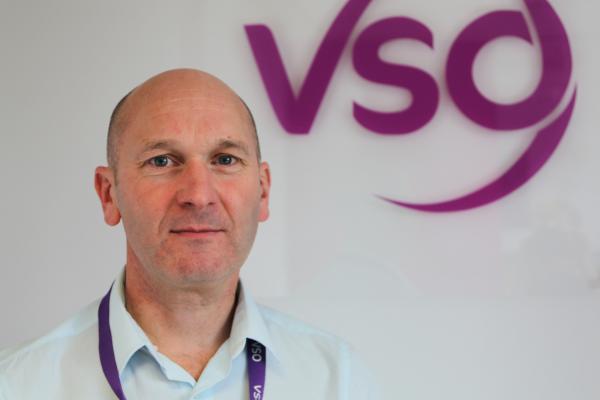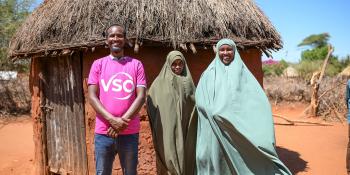As the world’s leading organisation that uses volunteering to tackle poverty, we are especially interested in understanding how we can best ensure that people of all sorts of backgrounds can access meaningful volunteering opportunities, writes Philip Goodwin, chief executive of VSO.
In the UK alone, one in every four people has experienced a mental health problem in the past year. Yet despite this prevalence, the topic is all-too-often overlooked and misunderstood.
While the stigma that surrounds mental health is fading, we still need to do so much more to ensure that everyone with mental health problems gets equal chances to take part, as well as the right support with which to make the most of them.
Understanding volunteering and mental health
As the world’s leading organisation that uses volunteering to tackle poverty, VSO is especially interested in understanding how we can best ensure that people of all sorts of backgrounds can access meaningful volunteering opportunities.
That’s why we’re launching new research today that shines a light on the experiences of young British volunteers facing mental health challenges.
The research was completed by Lancaster University, and initiated by our own International Citizen Service development programme. ICS prides itself on being inclusive, and reaching out to the broadest possible range of young people.
We wanted to know how young volunteers, including those with a history of mental health issues, cope with the challenges they face working in some of the world’s poorest communities? What's the impact of an experience like this on mental health? And, how can programmes like ICS best support their volunteers and staff?
Communicating freely

VSO CEO Philip Goodwin on our commitment to supporting our volunteers
Some research findings are striking. We learned that relatively few of our volunteers with a history of mental health problems, declared this in the health screening they underwent as part of their application.
Given the stigma surrounding mental health, perhaps this shouldn’t surprise us. Nonetheless, the finding acts as a reminder that all of us need to step up our efforts and communicate that applicants have nothing to lose by opening up.
At ICS we’re taking this finding as a lesson that we need to be clearer in communicating to young people that, rather than automatically hindering a successful application, disclosing an accurate picture of mental health history actually allows us to ensure the right support is in place for a placement to have the best chance of success.
Positive experiences
On this front, the research findings are incredibly encouraging. Overwhelmingly, volunteers with a history of mental health problems and our partner agencies were positive about their volunteer placements. Almost every volunteer in the survey listed at least one benefit.
Interestingly, it was those volunteers with a history of mental health problems that were most likely to report benefits. They reported that their placements had a positive impact on their leadership skills. One volunteer said:
ICS challenged my resilience on a whole other level. It's living proof of the fact that I am adaptable, and I can survive in all sorts of challenges.
While volunteering is extremely rewarding, it’s not easy. Most youth volunteers from the UK hadn’t experienced similar conditions in low-income countries before taking on an ICS placement. It is understandable therefore, that half of all volunteers in the survey said they needed extra support on placement.
What action are we taking?
We've overhauled the training course for youth volunteers. This will help volunteers to be emotionally as well as physically prepared.
The research recommendations are helping us to better support all volunteers and staff. For example, drawing on the findings on psychological resilience and support for team leaders, who can at times feel pressured, we've overhauled the training course for youth volunteers. This will help volunteers to be emotionally as well as physically prepared.
We’re also helping all volunteers, including team leaders, and staff in-country to cope with problems as they arise. We’ve invested in new duty of care training for staff who work closest to volunteers in the community. The four-day course covers safeguarding, security and health, with one day focusing on resilience and supporting volunteers in emotional distress. And at VSO, we have a 24-hour access to unlimited phone counselling for volunteers and team leaders.
A win-win for all
I’m confident that these improvements will have far-reaching benefits for team leaders, staff and all volunteers – not only those who experience mental health problems.
This research has helped fill gaps in knowledge and drive improvements in our programme. I also hope that its publication will foster greater openness on mental health issues. The more we know and understand, the better we can support each other.
Download reports
Download the Mental Health and Youth Volunteering Report Overview (PDF)
Download the Mental Health and Youth Volunteering Summary Report (PDF)
Read more

The two volunteers empowering girls and young women in Mozambique
Nelma and Carmirene and are two volunteers working on VSO's EAGLE project in Mozambique. For Nelma and Carmirene, education is not just about school, it is about meeting people where they are and using the right tools to challenging harmful norms. Here are their stories.

A ripple of change: how VSO volunteers are transforming communities
Every act of volunteering begins with a choice — a decision to act out of a desire to make a difference. Across the world, VSO volunteers are proving that one spark of action can ignite something much bigger.
Opening doors to safety, education, and a brighter future
For girls in Karamoja, the poorest region in Uganda, being forced into early motherhood is all too common. This Christmas, you can open the doors to Safety, Education, and a Brighter Future.
